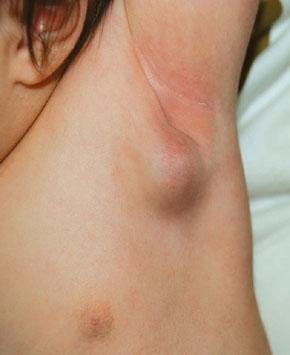BCG Lymphadenitis with thanks to Dr Mujahid Hassan
Lymphadenitis is the most common complication of BCG vaccination, and is of two types – suppurative and non-suppurative.
Normal course post-vaccination:
Intradermal injection -> local multiplication of vaccine -> transport to lymphatics via lymph glands -> haematogenous dissemination of BCG.
No clear definition of ‘BCG lymphadenitis,’ proposed definition is when it becomes palpable or concerning for parents.
Can appear as early as two weeks after vaccination, most within 6 months and almost all cases will be within 24 months.
Normally ipsilateral with one or two palpable lymph nodes, but can involve multiple nodes. Normally axillary but can be with cervical/supraclavicular.
Diagnosis:
- Isolated lymph node enlargement
- BCG vaccination to ipsilateral side
- Absence of tenderness or heat to lump
- Absence of fever
Non-suppurative will resolve within a few weeks – this is a normal reaction and most of these are sub-clinical so go unnoticed.
Suppurative involves an enlarging lymph node with fluctuant appearances, oedema and erythema. Happens in ’30-80%’ of cases of lymphadenitis.
Treatment of suppurative lymphadenitis:
Antibiotics: Previously erythromycin/rifampicin/isoniazid have been used but their clinical role is of dubious significance, so are not used routinely.
Reassurance and followup are what is needed.
Fine Needle Aspiration: Suppurative lymphadenitis can result in spontaneous perforation and sinus formation, which can result in several unpleasant months of dressing and wound care. FNA is thus recommended to prevent this and reduce time for healing.
Surgical excision: Risks of general anaesthesia – other than in extreme cases of failed FNA/multiloculated lymph nodes – far outweigh the potential benefits.
Non-suppurative
Management pathway and images courtesy of:
WM Chan, YW Kwan, CW Leung. Management of Bacillus Calmette-Guérin Lymphadenitis, Hong Kong Journal of Paediatrics (New Series). Vol 16. No. 2, 2011, available via http://www.hkjpaed.org/details.asp?id=782&show=1234
References:
J Goraya and V Virdi, Bacille Calmette-Guérin lymphadenitis, Postgrad Med J. 2002 June; 78(920): 327–329,
available via http://www.ncbi.nlm.nih.gov/pmc/articles/PMC1742390/pdf/v078p00327.pdf



My baby is 3 months old and we had bcg vaccination during his birth and now from few days we are observing a lymphnode swelling around his neck ie cervical lymphnode.. Doctors are saying this can be due to infection… please advise whether this can be a bcg infection
I am afraid that I can not offer individual medical advice on this website. Please discuss your concerns with your own GP or paediatrician who can fully assess your baby. Dr Julia Thomson
My baby is 3 and half months old and we had bcg vaccination during his birth and now from few days we are observing a lymphnode swelling in armpit Doctors are saying this is due to bcg infection please advise whether this can be a bcg infection ?? And paediatrician told it may or may not form puss will this heal by self ??
Dear Pallavi
I can’t answer individual questions on this forum I’m afraid but it is very common to have a lymph node swelling due to a BCG infection as written about in this article. Best to ask your baby’s individual’s GP or paediatrician.
Julia
HI….MY FOUR MONTHS OLD HAD SAME ISSUE…IT IS RECENTLY TREATED BY THE DOCTORS BY EXTRACTING PUS FROM INSIDE THRU MAKING A SMALL CUT……PUS WHEN TESTED IS INFECTED WITH TB…NOW MEDICINES WILL BE PRESCRIBED TOMMORROW. …MAY I KNOW WHAT IS THE DEVELOPMENT IN YOUR CASE
Am afraid of this BCG lymph swelling in my baby’s armpit. Doctor tried surgical to take out pus, but it was in sold form. She was put on Bacteria treatment but no change. What should I do, plse
Jamillah – I can’t comment on individual cases here I’m afraid. As you can see from the article, non-suppurative (the solid type) cases don’t really need any treatment. You should go back to your baby’s doctor to discuss the plan.